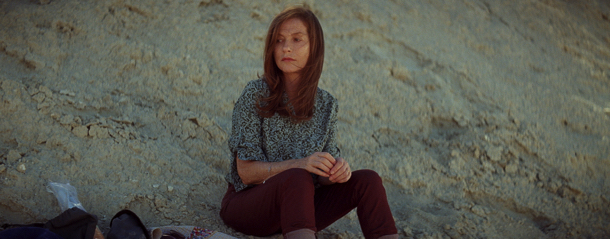
Dir.: Guillaume Nicloux
Cast: Isabelle Huppert, Gerard Depardieu
France/Belgium 2015, 91 min.
Several decades after after appearing together in Maurice Pialat’s Loulou, Isabelle Huppert and Gérard Depardieu are reunited in Guilluame Nicloux’s VALLEY OF LOVE, where they play a long divorced middle-aged couple, trying to come to terms with the death of their adult son Michael, who committed suicide.
Whilst Huppert and Depardieu have gone from strength to strength in their careers, not only in France, the director has struggled since his debut with Les Enfants Volant in 1991. Guillaume Nicloux’s twelve feature films – among them a remake of Rivette’s La Religieuse, also starring Isabelle Huppert – vary in style and content, but always seem to fall short; never fulfilling the director’s great potential. With VALLEY OF LOVE Nicloux has finally realised his ambitions as scriptwriter and director: a contemporary parable of spirituality, very much in the way of Robert Bresson.
A long tracking shot of Isabelle (Huppert) opens the films, the camera follows her patiently through a resort in the Eastern Californian desert. Later she meets Gerard (Depardieu), who turns out to be her long divorced ex-husband. Both are uneasy, after all, they have come here for a ‘meeting’ with their son Michael, who committed suicide a few months previously, but who has written letters to both his parents agreeing to meet them – albeit briefly – in one of seven spots in Death Valley, as described in the letters. The two have not been very attentive parents: sending him to boarding school at a very young age, and after his 18th birthday have lost contact more or less altogether – Isabelle even missing his funeral. Michael was gay, and his mother is more concerned whether he had Aids, than the reason for his suicide.
Wiry, passive-aggressive Isabelle is seemingly the total opposite of her saggy-bodied ex-spouse, who is fond of banal small-talk and avoidance. But somehow, they not only end up in bed together, but find a common language, their old emotional bonds surfacing – even though they have nothing in common anymore. But they visit the Death Valley rendezvous, as instructed, Gerard suffering particularly in the overbearing heat. They mourn their own lives more than the loss of their son: new partners and children have obviously not satisfied them any more than their own relationship: Isabelle is separating from her husband, and Gerard is distraught about his fragmented life, having been diagnosed with cancer of the bladder. He wants to see a consultant for a second opinion, leaving a day earlier than asked for by Michael – something Isabelle fights vigorously. There is a spooky nighttime scene on the tennis court, when Gerard is visited by a ghost – David Lynch would have been proud of it. But the way Nicloux introduces some spiritual healing for this dreadfully ordinary and self-obsessed couple, is truly amazing.
DoP Christophe Offenstein creates serene widescreen images, dwarfing the main protagonists in the desert and towering mountains. Charles Ives’ mournful, a-tonal music underlining the couple’s struggle to come to terms with their own lives as well as the loss of their son. Huppert and Depardieu are always caustic to the point: she answers his statement “I got fat” with a dismissive “Whatever makes you happy”. The ethereal paradise they can’t grasp at first, finally allows them a view beyond the boxed-in existence they call reality and Nicloux ends with a glimmer of hope – like with Bresson, you don’t have to be exceptional to be chosen. AS.